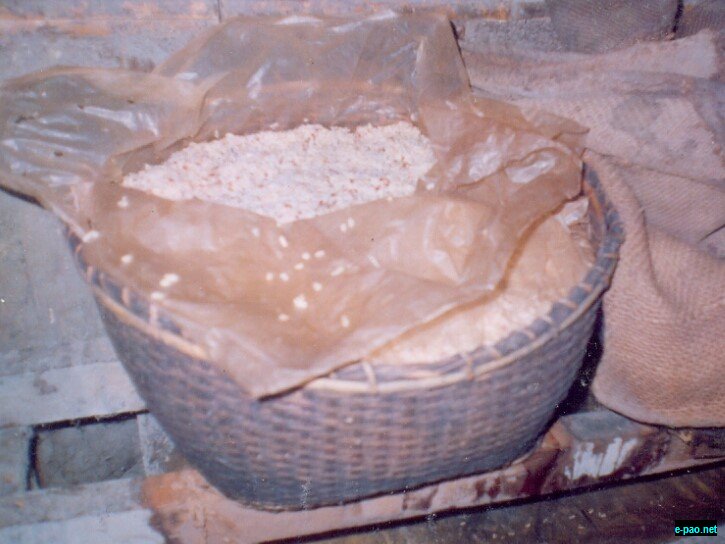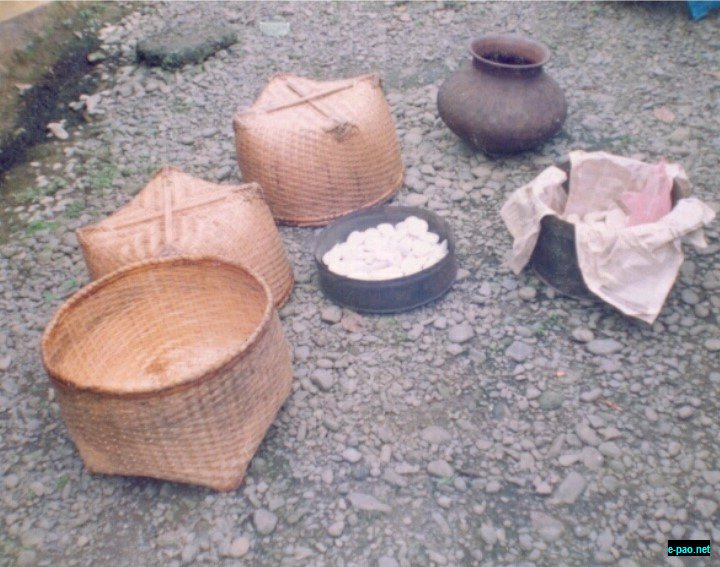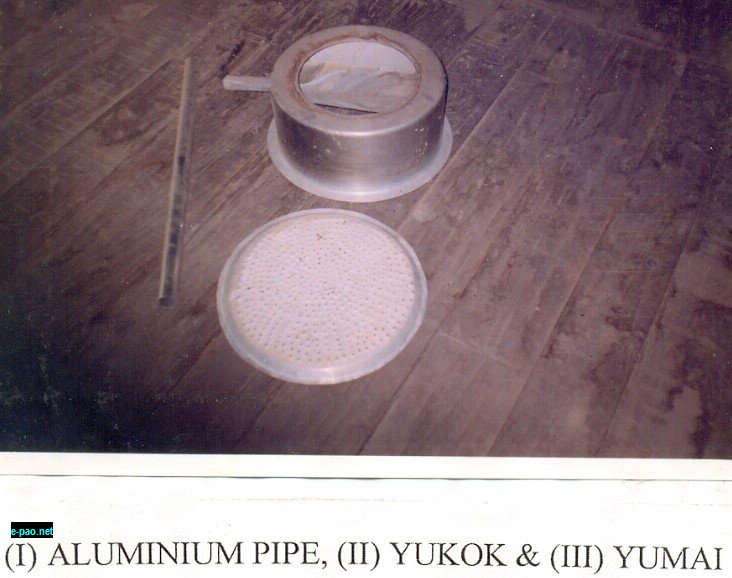Traditional Knowledge System of Distilling Alcoholic Rice Beverage among The Loi People of Awang Sekmai, Manipur
- Part 1 -
Prof. S. Mangi Singh / Dr. Ayangbam Shyamkishor *

Luthup Khunba :: System of Distilling Alcoholic Rice Beverage among The Loi People of Awang Sekmai
Introduction:
The Lois are one of the two indigenous Scheduled Castes of Manipur, the other being Yaithibi. Literally the term Loi means subdued ones or those who pay tribute to a sovereign. There are numerous Loi villages in Manipur. However, not all the inhabitants are recognized as Loi villages. After Manipur's merger into India, only inhabitants of eight Loi villages were given the status of Scheduled Castes.
These villages are
1) Phayeng,
2) Sekmai (Awang Sekmai),
3) Koutruk,
4) Leimaram,
5) Leimaram Khunou,
6) Andro,
7) Khurkhul and
8) Kwatha.
As a result, at present there are a number of other villages which have been recognized as historically Loi villages though their inhabitants are not recognized as Scheduled Castes. These villages are Khe-Sekmai, Thongjao, Thoubandong, Kakching, Sikhong, Ningel, Tensang, Chairel, Loibok Leishangkhong, Heiyel, Hangol, Phoubakchao, Waikhong, Thanga, Moirang, Wangoo, Nungoo, sugnu, Langathel, pallel and Arong Loi. At present, there are some organized demands from the inhabitants of these villages for their recognition as Scheduled Castes.
Awang Sekmai, a Loi village in the Imphal-Dimapur road (National Highway No. 39) is 19 km far from Imphal, the capital of Manipur. The traditional occupation of the people of this village, apart from agriculture, is that of the preparation of Alcoholic Rice Beverage. It is also an occupation mainly taken up by the womenfolk. In all, the people of Sekmai (as Awang Sekmai is popularly known) prepare three varieties of drinks manufactured from rice. They are "Pukyu', "Waiyu' and "Leiyu'.
"Yu' is the Manipur word for Alcoholic Rice Beverage and these three are three different varieties of Alcoholic Rice Beverage prepared from rice. The first two are basically meant for use during religious and ceremonial rites like that of the Lai Haraoba, and as such they are prepared only on rare occasions. They are not prepared fro general consumption or commercial purposes.
The last one i.e. "Leiyu', on the other hand is produced both for general use and commercial purposes. And even though all the three are different types of "yu' prepared from rice, it is "Leiyu' which have come to be popularly known as "yu'. Besides, of the three varieties, it is only the "Leiyu' or "yu' which is brewed by a process of distillation. Compared to this, the alcohol content of the other two varieties are low and they are mild drinks like beer.
In fact, they may be more appropriately termed as rice beer. But as the term "yu' is used to mean both strong as well as mild drinks both are also taken as different varieties of "yu' or Alcoholic Rice Beverage. This paper explores the traditional skill of the Lois for preparing this Alcoholic Rice Beverage called "Leiyu', henceforth termed simply as "yu' in the paper.

Bamboo Basket Earthern Pot and Hamei :: System of Distilling Alcoholic Rice Beverage among The Loi People of Awang Sekmai
The process of distilling Alcoholic Rice Beverage or "yu":
The process of distilling Alcoholic Rice Beverage is locally known as yu thongba. It normally takes four to five days depending on the weather. During summer (March to September), it usually takes four days and in winter (October to February), it usually takes five days. This is because of the fact that when the temperature rises during the summer months, the process of fermentation is faster and when the temperature falls during the winter months, the process is slower.
Two important ingredients are required for making yu. They are unpolished rice and hamei, a kind of malt. Unpolished rice is used for preparing yu because the people believe that yu prepared from it is much better in quality than yu prepared from polished rice. They believed that nutrients like vitamins, proteins, etc. are taken away if the rice is polished. This adversely affects the quality of the yu.
Hamei, on the other hand, is made up of rice and yangli, a wild creeper (Albizzia mycrophylla). Then the yangli is dried properly. Later, when the hamei is about to be prepared, it is cut into small pieces and are kept soaked for about two hours or so. Some unpolished rice is also left soaked in water for a night or for about 12 hours. Later, it is collected in a basket and dried for a while. The rice is then crushed so as to turn it into fine powder.
The rice powder and the pieces of yangli are then mixed up together along with water. Then, the dough so prepared is turned into thick flat round shapes. These are called hameis. They are left to dry over flat and broad baskets. A lining of straw or paddy husks is made on the surface of the basket before they are spread without overlapping over one another. They are again covered by a cloth and allowed to dry for four or five days depending on the weather conditions.
The lining of the surface of the baskets is believed to increase the warmth beneath the cloth. After drying it, the hameis are taken out and spread in the sunshine to make it further dry. Once it is done, the hamei is ready to be used for preparing the yu. It may be note here that a taboo is to be observed by the person who prepares the hamei. That is, while preparing the hamei, the person should not touch any kind of fruit. Otherwise, they believe that the whole preparation will get spoiled.
Utensils and other materials required for the distillation process:
The different utensils and other materials required for the distillation are as follows:
1. Baskets made of bamboo;
2. Pots, earthen or aluminum ones;
3. Vessels;
4. Aluminum plates;
5. Aluminum tins;
6. Tubs;
7. Yukok, the container within which the steam shall get condensed;
8. Aluminum or rubber pipe through which the distillated yu will flow down;
9. Yumai, an aluminum plate with small numerous holes on which surface the steam is to be allowed to come up.
Steps towards distillation:
The process of distillation usually starts in the morning. First of all, the unpolished rice is cooked properly in a pot which is locally known as chakngan chaphu. The cooked rice is known as chakngan and the preparation of it is known as chakngan thongba. The cooked rice or chakngan is then taken out from the pot and kept in a basket locally known as chakngan sangbai (a big bamboo basket). After that the chakngan is washed properly by pouring water over the basket. This step is known as chakngan chamba.
Proper washing of the chakngan (the cooked rice) is believed to serve many purposes. First, it allows the chakngan to cool down quickly and also helps in washing away the starch. Moreover, this also helps in quicker and proper fermentation of the chakngan. After washing the chakngan, it is allowed to drip dry for a while so that all the unsoaked water shall fall down. It may be remembered here that in olden days, people did not wash the chakngan.
Instead, they spread it thin and wide on a big mat till the rice is cooled down properly. This method however is believed to be not so conducive to proper and quicker fermentation of the chakngan. So, this old method is more or less abandoned altogether nowadays by the people of Sekmai. Still, in some Loi villages in Manipur like Phayeng and Andro, this method is still continuing.
Next, the chakngan which is properly washed and dried up is mixed with the hamei. The hamei is first crushed into powder before mixing with the chakngan. The adding of hamei here serves twofold purposes – 1) to produce intoxication and 2) to accelerate the process of fermentation of the chakngan.
As per a rough estimate, 30 gram of hamei powder is mixed with about chakngan prepared from 10 kg of unpolished rice. The mixture is then transferred into a basket (or a tin). A proper lining of leaves on the interior of the wall of basket is also made. The leaves normally used there is that of khangra tree (parrot tree, also known as Flame of the forest, Butea monosperma) or Hong-oo (Alocasia Indica) or Sangoi Hidak angouba mana (leaves of Datura mettel).
The people have however, started using polythene sheets for lining the basket. It is mainly because of the fact nowadays it is becoming more and more difficult to find these leaves. Besides, polythene seeds are very handy to be used, easily washable and readily available in the market. The basket containing the mixture is then covered properly by warm clothes or sacks so as to make the mixture warm which in turn will help fermentation.

Alluminum pipe Yukok and Yumai :: System of Distilling Alcoholic Rice Beverage among The Loi People of Awang Sekmai
The basket is then place above a tub. This process of keeping the mixture inside the basket is known as luthup chanba. An aluminum tin may also be used instead of the basket. The entire process is completed in the morning of the first day. On the 2nd day, the mixture, with fermentation having already started, will start realizing fluid.
The fluid will drip out of the mixture drop by drop and get collected inside a tub. The so released fluid is known as khari. The dripping out of khari may start in the morning or later in the evening depending on the weather condition. During summer, the mixture gets properly fermented in the evening of the 2nd day. The fermented mixture is called khajee.
The mixture before it gets properly fermented is known as khajee houdaba whereas the mixture when it gets properly fermented is known as khajee houba. During winter proper fermentation takes place in the morning of the third day.
It may be remembered here that the quantity of khari which is released during this period is less in the early stages of fermentation and is more at the final stages of fermentation. Proper fermentation of the mixture is also important for the quality of yu that will be distilled. If proper fermentation is not there, it will adversely affect the quality and quantity of the yu.
However, proper fermentation of the mixture does not necessarily depend on the time allotted for the fermentation but mainly on the quality of hamei added to the mixture. Next, the properly fermented khajee will be transferred to another large container along with the khari which was released during the period of fermentation.
Inside the large pot, they will get further mixed with water. The amount of water to be mixed up with the mixture of khari and khajee is roughly of the same proportion i.e., 1:1. This process is known as khajee khunba and this is done in the evening of the second day during summer and in the morning of the third day in winter.
(To be continued .....)
* Prof. S. Mangi Singh / Dr. Ayangbam Shyamkishor wrote this article as part of Seminar proceedings at Centre for Manipur Studies, Manipur University.
Prof. S. Mangi Singh is at Political Science Dept., Manipur University and Dr. Ayangbam Shyamkishor is Asst. Professor, Political Science Dept., Mizoram University
This article was forwarded by Aheibam Koireng Singh who can be contacted at akoireng(AT)gmail(DOT)com
This article was posted on June 15, 2017.
* Comments posted by users in this discussion thread and other parts of this site are opinions of the individuals posting them (whose user ID is displayed alongside) and not the views of e-pao.net. We strongly recommend that users exercise responsibility, sensitivity and caution over language while writing your opinions which will be seen and read by other users. Please read a complete Guideline on using comments on this website.







